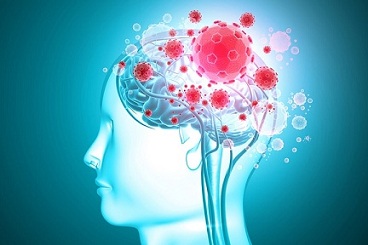Neuro-COVID-19: Study By Northwestern University Shows That 80 Percent Of COVID-19 Patients Suffer Neurological Symptoms
Neuro-COVID-19 Oct 06, 2020 5 years, 4 months, 3 weeks, 14 hours, 29 minutes ago
Neuro-COVID-19: A new study by researchers from Department of Neurology, Northwestern University Feinberg School of Medicine-Chicago reveals concerning new findings: Neurological symptoms occur in 8 of 10 hospitalized COVID-19 patients or about 80 percent of all such patients.

Typical manifestations include muscle pain, headaches, dizziness, encephalopathy and "brain fog."
The research findings were published on October 5th in the journal:
Annals of Clinical and Translational Neurology.
https://onlinelibrary.wiley.com/doi/10.1002/acn3.51210
Study co-author Dr Igor Koralnik who oversees the Neuro COVID-19 Clinic at Northwestern Memorial Hospital in Chicago told Thailand Medical News, "Encephalopathy, which is characterized by altered mental function ranging from mild confusion to coma, is the most severe neurologic manifestation of COVID-19."
The researchers for this new study, analyzed the charts of about 509 patients hospitalized for COVID-19 within the Chicago-based Northwestern Medicine health system.
The study team identified neurological symptoms in 42% of patients when their COVID-19 symptoms surfaced, 63% of patients when hospitalized, and 82% of patients at any time during the course of COVID-19.
It was found that most of the patients reported muscle pain (45%) and headaches (38%). Encephalopathy and dizziness were seen in almost one-third of patients. The study also found 16% had taste disorders and 11% had smell disorders.
Alarmingly, after discharge from the hospital, only 32% of patients with encephalopathy were able to care for their own affairs, compared to 89% of those who didn't develop encephalopathy, the study findings showed.
Significantly, the death rate in patients with encephalopathy was much higher (about 22%) than in those without encephalopathy (3%), according to the study.
Dr Koralnik who is chief of neuro-infectious diseases and global neurology at Northwestern Medicine further added, "We are now looking to characterize the long-term neurologic effects of COVID-19 and the cognitive outcomes in patients with COVID-19-associated encephalopathy."
He continues, "
We are studying this in patients who are discharged from the hospital, as well as in COVID-19 'long-haulers,' who have never been hospitalized but also suffer from a similar range of neurological problems, including brain fog."
The new study findings will help shape long-term care for people who suffer from neurological complications of COVID-19.
Dr Koralnik said, "Patients and clinicians need to be aware of the high frequency of neurologic manifestations of COVID-19 and the severity of altered mental function associated with this disease.”
These results expand findings of neurologic manifestations in 36.4% of hospitalized Covid‐19
patients in China and 57.4% in Europe, albeit with increased prevalence in our US cohort.
https://pubmed.ncbi.nlm.nih.gov/32275288/
https://pubmed.ncbi.nlm.nih.gov/32482845/
Differences in frequencies may be caused by genetic factors including polymorphism in expression of the viral receptor angiotensin‐converting enzyme 2 (ACE 2) in the nervous system, and possibly, SARS‐CoV‐2 strain variations.
https://pubmed.ncbi.nlm.nih.gov/32129843/
The fact that any neurologic manifestations as a whole were more likely to occur in younger people is surprising, and could potentially be explained by greater clinical emphasis on the risk of respiratory failure than other symptoms in older patients. Alternatively, early neurologic manifestations such as myalgia, headache, or dizziness may have prompted earlier medical care. In contrast, encephalopathy was more frequent in older patients.
Also attention should be paid to asymptomatic individuals as these incidences of such neurological manifestations seems to be higher in this group according to emerging studies with many not even aware of what is happening to them or why.
It is not known whether Trump is suffering from any of these neurological problems. He was admitted Friday to Walter Reed National Military Medical Center in Bethesda, MD., for treatment of COVID-19. Meanwhile, First Lady Melania Trump and a number of senior U.S. officials have also tested positive for the new coronavirus. In the case of Trump however, there is growing belief that he was already suffering from mental issues way before the COVID-19 crisis.
The study team admitted limitations to the study, “Our study has limitations, including its retrospective nature, and the fact that fewer than 6% of patients were evaluated by neurologists or neurosurgeons. Since most patients were admitted to dedicated Covid‐19 wards or ICUs with strict infection control precautions in place, access to brain CT or MRI was not as readily available as for other patients with neurologic diseases.”
For more on
Neuro-COVID-19, keep on logging to Thailand Medical News.
